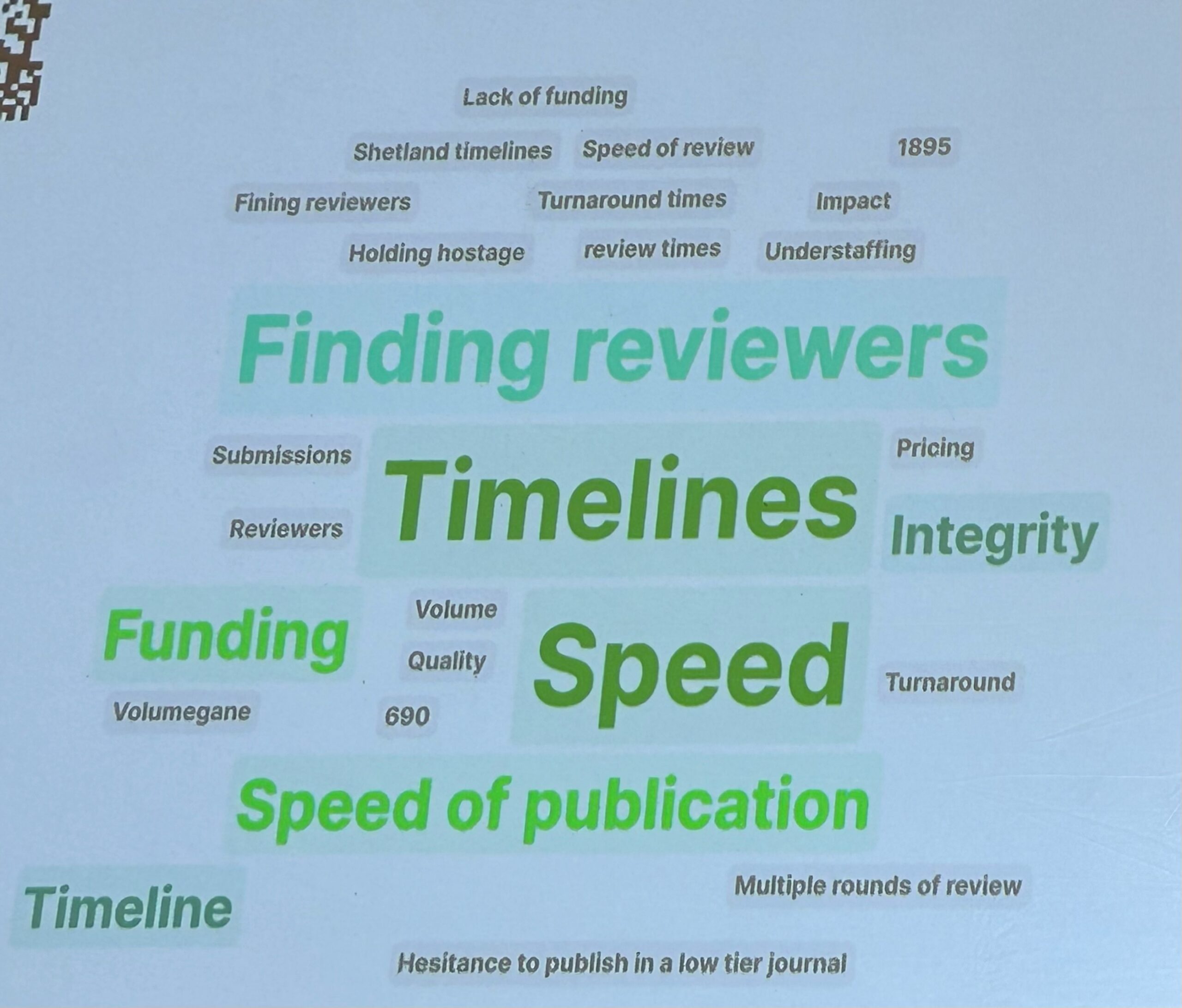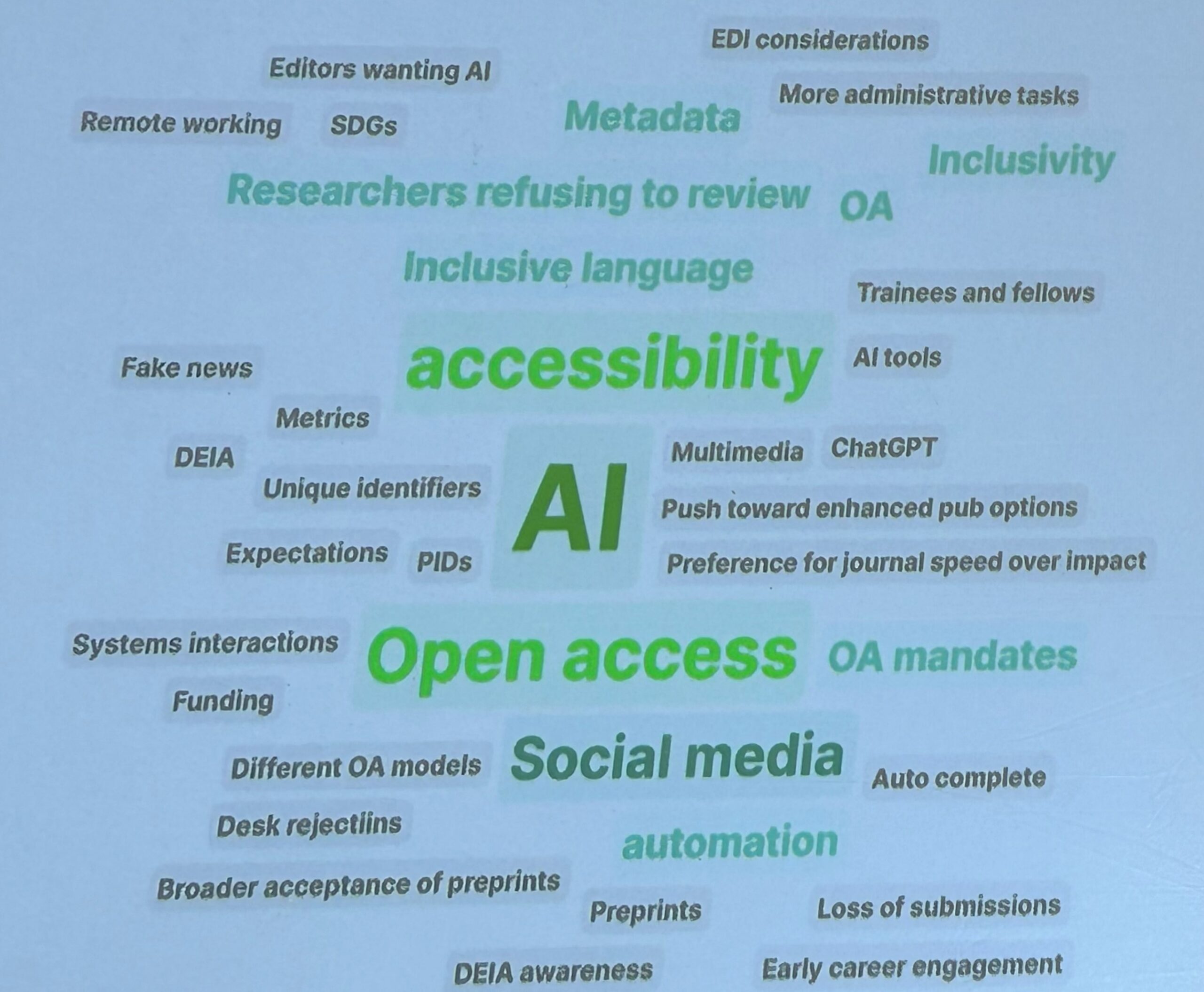SPEAKERS:
Mia Ricci
Director, Publications Operations
American Geophysical Union
Deborah C Poff, CM, PhD
Editor, Journal of Scholarly Publishing
Editor-in-Chief, Encyclopedia of Business and Professional Ethics
Editor-in-Chief, Advances in Business Ethics Research
Dianne Dixon
Managing Editor
International Journal of Radiation Biology
MODERATOR:
Carolyn deCourt
Client Manager, Editorial Services
J&J Editorial
REPORTER:
Tony Alves
SVP Product Management
Highwire Press
For the session “Evolving Research Attitudes Towards Journals and Scholarly Publishers,” moderator Carolyn deCourt asked the panelists to introduce themselves and provide their credentials. The first panelist and speaker, Deborah C Poff, CM, PhD, is the Editor of the Journal of Scholarly Publishing. She also serves as Editor-in-Chief of both the Encyclopedia of Business and Professional Ethics, and Advances in Business Ethics Research. The second panelist and speaker, Mia Ricci, is the Director of Publications Operations at the American Geophysical Union. The third panelist, Dianne Dixon, who joined for the Q&A portion of the session, is Managing Editor for the International Journal of Radiation Biology.
Poff kicked off the session with a discussion of the evolution of the treatment of scholarly publications by universities, and the impact that treatment has on researcher approach to publishing in journals. Poff noted that over the past 30 years, there has been an emphasis on quantity over quality, with a shift toward publishing as many articles as possible to bolster a CV. This shift has opened up the opportunity for bad players, like predatory publishers, who produce substandard journals that abuse open access policies to trick researchers into thinking they are submitting to legitimate journals, and paper mills, organizations that create fake papers and sell authorship to those papers.
Poff blames the pressure to publish on the growing importance of national and international rankings of universities. These rankings are used by governments and funders to direct resources to high-ranking universities. This in turn compels university administrators to put pressure on their faculty to publish more research, including faculty in disciplines that do not have a strong research tradition like fine arts and music. Poff says, “What this translates to for editors of journals is a greatly increased number of graduate students and very junior faculty aggressively struggling to get articles published when they lack the polish and the experience of developing over time within their field.” The result is a proliferation of plagiarized and fake papers from paper mills, and the use of predatory journals. It also results in over-emphasizing the sciences in our higher education systems, at the expense of liberal arts and other nonresearch-oriented programs.
Poff advocates an intentional move toward greater diversity in representation at both the institutional level and by journal publishers. She cites evidence from her work at both the Journal of Academic Ethics and the Journal of Scholarly Publishing, that certain groups, such as women, different racial groups, and persons for whom English is not a first language, are discriminated against. There is a documented “preference of gatekeeper for manuscripts from authors with shared characteristics.” By diversifying representation of editors, associate editors, editorial boards, and peer reviewers, journals will be able to mitigate bias in peer review and open up the system to more researchers, alleviating the bottleneck that can contribute to bad practices.
Ricci took the discussion deeper into researcher attitudes by reviewing multiple industry reports, starting with a 2018 Editage survey on author perspectives on academic publishing. Key findings included the following: 76% find manuscript preparation challenging; 66% find journal guidelines unclear; there is general unhappiness with turnaround times (researchers want less than 3 months from submission to publication); 70% find it difficult to respond to reviewers; and perhaps most relevant to Poff’s previous discussion, the pressure to publish in high–impact factor journals was an urgent problem.
The second report was Publons’ 2018 report on the global state of peer review, which combines data from Web of Science, ScholarOne, and Publons’ 2018 Global Reviewer Survey. Key findings include the following: established regions dominate peer review due to geographic biases in the appointment of editors and their tendency to use reviewers from their region; emerging regions are increasing representation, but are years away from bridging the gap; finding reviewers is getting harder; reviewers from emerging regions are more likely to accept review requests, but those reviews are shorter in length; more training is needed and universities need to recognize the importance of peer reviewing as an accredited activity.
Ricci then reviewed a 2021 Wiley Open Research Survey which showed 67% of researchers felt that publishing open access (OA) increases impact; 61% felt OA was a public benefit; and 35% were motivated to publish OA for transparency and data reuse. The report also looked at reasons why researchers upload manuscripts to preprint servers, with 30% of authors having uploaded research to a preprint server, up from 20% in 2019. The number 1 reason was “faster dissemination” (45%), the number 2 reason was “get feedback on their work” (34%). Post publications, 84% of researchers report sharing their articles on public and institutional repositories.
The fourth report that Ricci presented was from Renew Publishing Consultants from 2021 examining how readers discover content in scholarly publications. Key findings include the following: abstracting and indexing databases are top search starting points, especially for life sciences; Google Scholar continues to rise in usage; use of preprints are still concentrated in physics; the value of journal websites has gone up; readers seek out OA content; and social media provides accidental exposure to articles.
Ricci wrapped up her presentation with a look at the society publisher perspective, noting that it is a balancing act between open science, inclusivity, and sustainability. Societies are expected to publish high quality science, promote publishing best practices, make the research they publish accessible to all, and most importantly, serve their membership. Ricci points out that publishers and researchers share many of the same goals and that the principles of diversity, equity, inclusion, and accessibility can be applied to all aspects of scholarly publishing.
The session finished up with an engaging, audience-participation exercise in creating “word-clouds”, and a panel discussion around the most prominent words in those word-clouds. The first question was “What are some publishing pressures you’ve heard of, encountered, or seen?” (Figure 1)

The biggest resulting words or phrases were “timelines”; “speed”; “finding reviewers”; “speed of publication”; and “funding and integrity”. In reaction, Poff noted that it’s hard to find reviewers, but it is even harder to get reviews of papers whose authors are non-English speaking. Dixon added that regional attitude is a problem; she has an associate editor who refuses to handle papers from a particular country. Dixon also suggested that reviewers be encouraged to partner with junior researchers to mentor them on how to peer review.
The second question was “What are the main shifts you’ve noticed, seen or experienced in your daily work?” (Figure 2)

The biggest resulting words or phrases were “AI”; “open access”; “accessibility”; “social media”; “automation”; “OA mandates”; “inclusive language”; “metadata”; and “researchers refusing to review”. An audience member asked, “Do you see AI helping open up the peer review pool?” Ricci responded that there is potential for bridging the language gap, but we still need to develop policies around the use of artificial intelligence. Poff reiterated that we need to rethink peer review; it needs to be more than volunteering—it needs to be an official, recognized activity.
